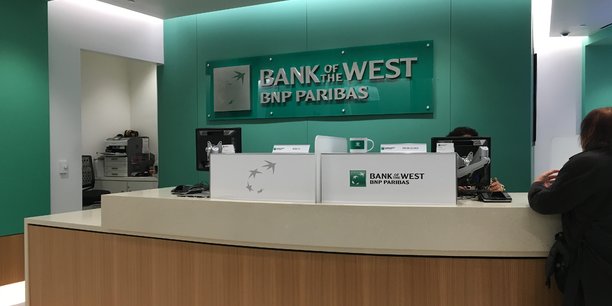BNP Paribas draws a line on its presence in retail banking in the United States, initiated in the 70s. According to a press release released this morning, the French banking group announces an agreement with the Canadian Bank of Montreal for the sale of 100% of the activities of Bank of the West, a Californian bank acquired in 1979, for a total amount of 16.3 billion dollars in cash (14.4 billion euros). The transaction should be completed during the year 2022 with, at the end of the day, a capital gain of 2.9 billion euros, according to BNP Paribas.
This assignment is not a surprise. For a year now, information has been circulating on BNP Paribas’ desire to leave the American market. It is part of a strategy of refocusing on Europe in the field of retail activities, with France, Italy and the Benelux as a point of contact. A strategy also followed by other large banking groups, such as HSBC which wants to stop its retail activities in the United States, like the Spanish BBVA, or conversely, like Citigroup which is withdrawing from the Europe.
A good financial transaction
The idea, a moment cherished, of creating large financial supermarkets on a global scale, under a single brand with a standardized offer, has lived, especially since the financial crisis of 2007. Each one is refocusing on its strategic areas, of as much as the synergies with Bank of the West were weak, with American regulations not very favorable to foreign groups. Moreover, BNP Paribas had already sold its small subsidiary First Hawaiian in 2019.
It is above all a good financial transaction for BNP Paribas. For two reasons. First of all, it sells its subsidiary at a high valuation multiple by European standards, ie 1.72 times the tangible net assets of Bank of the West (against 0.7 times for the group). In total, this subsidiary weighs around 20% of BNP Paribas’ market capitalization, while it only contributes 5% of the group’s consolidated results. However, the selling price remains below the expectations of financial analysts.
Then, this sale could allow the French group to fall below the threshold of the bank classification “more systemic” with increased capital requirements. Regulators indeed impose on these banks, such as JP Morgan, Citigroup or HSBC, a capital buffer of 2% of assets against 1.5% for other international banks.
A war chest of 7 billion euros
Once the sale is completed, BNP Paribas intends to propose to its shareholders the launch of a share buyback program, for an indicative amount of 4 billion euros (6% of capitalization), in order to neutralize the dilution of the net earnings per share. The group had already announced the largest share buyback program in ten years, amounting to 900 million euros, or 1.2% of market capitalization.
The proceeds of the sale will also allow BNP Paribas to redeploy its capital to the tune of 7 billion euros even though it is due to present its new strategic plan next February. The press release also outlines some avenues, such as “Strengthen organic growth” in Europe or make “targeted investments in innovative technologies and models”, even targeted acquisitions “In value-added activities”.
For example, the bank had already acquired Floa Bank in France, which specializes in split payment, even though this operation is small. Note also that BNP Paribas wishes to maintain a presence in the United States, but in the field of investment and corporate banking.


:quality(70)/cloudfront-us-east-1.images.arcpublishing.com/lanacionpy/L2GSQ2OXTFDLNLXQ7L4XFEBAF4.jfif)